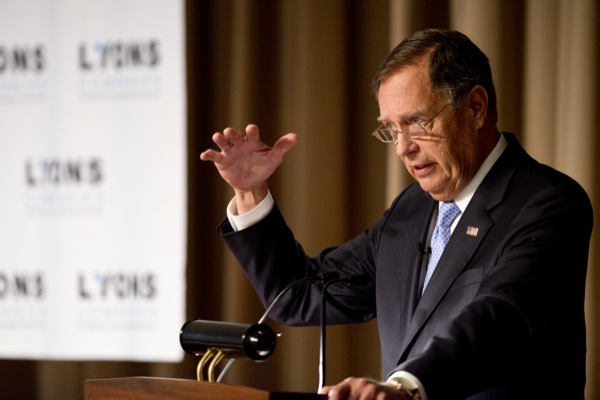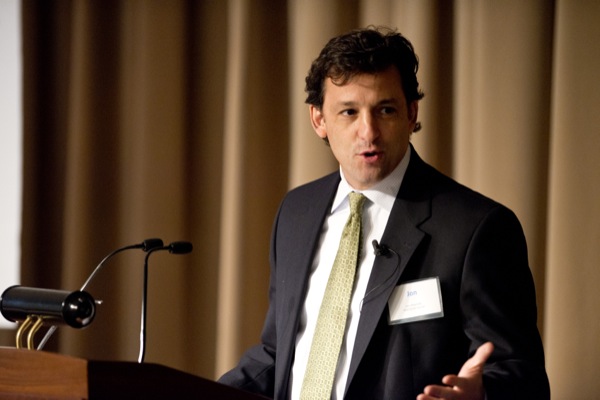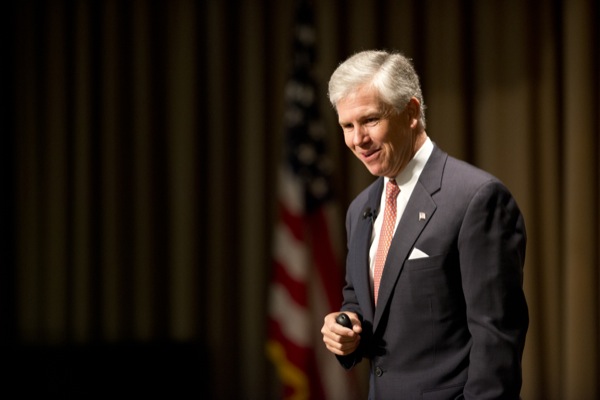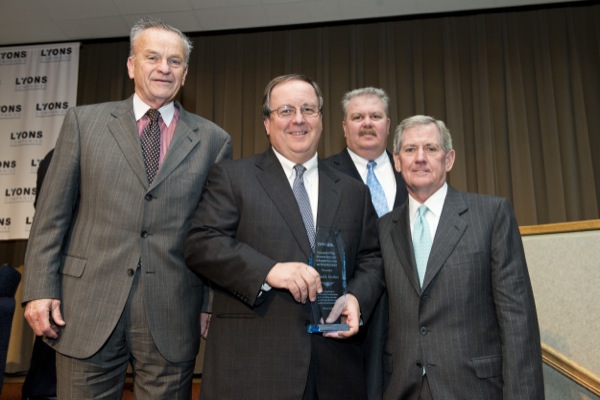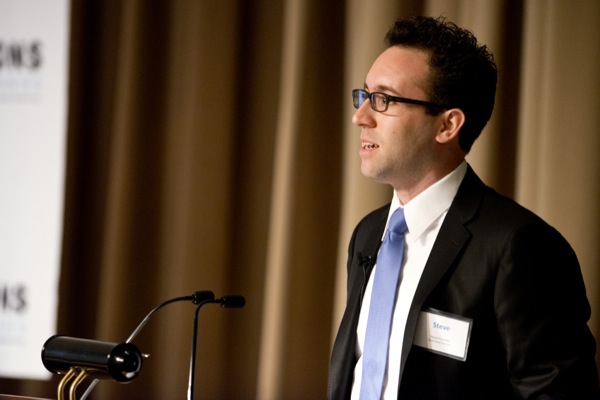Economic forecast
Experts say recovery hinges on sense of unity, financial balance
10:33 a.m., Feb. 21, 2013--Only compromise and attention to the fragile state of the recovering economy will help improve America’s economic situation, experts told attendees at the 2013 Economic Forecast held Feb.12 at the University of Delaware.
The event, sponsored by the Lyons Companies and UD’s Center for Economic Education and Entrepreneurship (CEEE), brought together a panel of experts -- including Michael Oxley, former congressman and chairman of the House Financial Services committee; Michael K. Farr, president of the portfolio management firm Farr, Miller and Washington, LLC; and Jon Hilsenrath, chief economic correspondent with the Wall Street Journal -- to speak on U.S. economic policy.
Campus Stories
From graduates, faculty
Doctoral hooding
Moderated by Steven Russolillio, a 2007 UD graduate who works for the Wall Street Journal, the panelists discussed a range of potential threats and safeguards to the recent economic resurgence.
According to Oxley, despite continued unemployment issues, impending tax increases and other looming issues, the economy still has the potential to bounce back with the help of middle class spending, solid leadership and unity among the public and Congress under one efficient leader.
“I served long enough in Congress to understand you can’t do anything in Washington that makes any sense and has any impact without strong presidential leadership, and so far we frankly haven’t had it,” said Oxley, who is of counsel at BakerHostetler LLP in Washington, D.C. “If we get that kind of presidential leadership I think you’re going to find a lot of folks in the country and in Congress who are willing to roll up their sleeves and deal with this problem.”
For Hilsenrath, the Federal Reserve System also plays a crucial role in the future of the economy because it has power in controlling the supply of money.
“When the Fed puts too little money into the economy, as we saw in the 1930s, it can cause a deep depression,” Hilsenrath said. “But when it puts too much in, as we saw in the 1970s, it can cause a big inflation. This gives the Fed enormous power but also puts it in the position of having a very challenging balancing act.”
Although there has been modest recovery and the value of the dollar has actually been relatively stable despite common perception, Hilsenrath said the possibility of a financial bubble brought on by pushing too much money into the economy remains.
“The piece of sobering news I leave you with is this world of financial turbulence that we have lived through may not be over,” said Hilsenrath.
Farr, who is also author of The Arrogance Cycle, also noted the relative disproportion of the economic recovery among the classes.
“The recovery has been heavily dependent on aggressive fiscal and monetary policy with the government shoving a lot of money into the market,” said Farr. “The recovery has benefited relatively few, meaning that the top one percent in this country has gotten a lot wealthier.”
Farr said one of the biggest issues with the economy is that the country cannot go on borrowing so heavily and the government must learn to function within its means, noting for every dollar, approximately 40 cents is borrowed.
Although Farr acknowledged the economy has a long way to go before making a full recovery, he noted confidence in the future of the nation is slowly improving; when he asked the audience how many people thought the economy would get better or remain the same over the next year more than half of attendees raised their hands.
“That’s important when you make a decision to spend, when you make a decision to buy, when you make a decision to save or you make a decision to invest,” Farr said. “I sat last night at this wonderful speaker’s dinner and my table companions were saying, ‘People have a lot of cash, what are they waiting for to start building? To start investing? To start growing again? When will they start hiring?’ And I looked at them and I said, ‘What’s it going to take for you?’”
Economic honors
During the event, John Cochran, vice chair of the University’s Board of Trustees, presented the second annual James B. O’Neill Award for Excellence in Economic Education and Entrepreneurship to Richard Struthers, president of Ashford Point Enterprises.
First awarded last year at the CEEE’s 40th anniversary celebration, the award is determined in consultation with CEEE, the Delaware Council on Economic Education and the Alfred Lerner College of Business and Economics, and recognizes an individual who has made a substantial contribution to promoting economic and financial literacy, as well as entrepreneurship.
“Serving as the first Delaware market president at the Bank of America and responsible for local business, civic and philanthropic leadership, Ric Struthers made financial literacy a personal and professional priority,” said Cochran. “His overarching goal was to ensure that every student in Delaware received a solid grounding in personal finance and economic education, one which Ric knew to be very important not only to our children, but also to the nation’s economic recovery.”
Cochran also praised Struthers for his support of financial education grants and services, including support that led to successful petitioning of state officials to incorporate personal finance into the Delaware social studies standards.
He also noted Struthers’ efforts to develop personal finance education Freshman Year Experience classes at the University in order to educate students on the safe use of credit and smart practice of money management.
Article by Rachel Taylor
Photos by Lane McLaughlin






